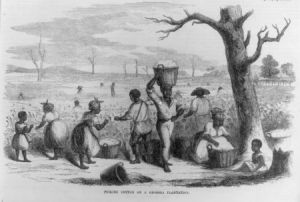 The Seventh-Day Baptist Central Association, meeting this month at the First Sabbath Day Baptist Church of Verona, New York, passes a resolution on slavery that echoes a resolution authored by the late Baptist leader John Leland and embraced by Virginia Baptists in 1789. The Central Association declares:
The Seventh-Day Baptist Central Association, meeting this month at the First Sabbath Day Baptist Church of Verona, New York, passes a resolution on slavery that echoes a resolution authored by the late Baptist leader John Leland and embraced by Virginia Baptists in 1789. The Central Association declares:
Resolved, That the members of this Association regard the system of American Slavery as a violation of the domestic rights of human nature, and hostile to the spirit of the Christian religion; that we recognize it as the root and cause of our present national troubles, and admit that what we are now suffering is only a just punishment for our sin in sustaining the iniquitous system; that we contemplate with unalloyed pleasure the action of the President of the United States looking to the emancipation of the slaves and will sustain such action by every means in our power, especially by beseeching Almighty God to prosper our armies, and hasten the day when every vestige of human bondage shall be removed from our land.
Seventy-four years earlier the (white) General Committee of Virginia Baptists had declared:
That slavery is a violent deprivation of the rights of nature, and inconsistent with a republican government, and therefore, recommend to our brethren to make use of every legal measure to extirpate this horrible evil from the land; and to pray to Almighty God that our honorable legislature may have it in their power to proclaim that great jubilee, consistent with the principles of good policy.
Virginia Baptists of the late eighteenth century, however, did not long maintain their anti-slavery position, instead embracing slavery by the 1820s in the face of a cotton-driven slave economy that positioned African bondage as the cornerstone of Christian society and culture. In so doing, Virginia Baptists became respected and prosperous in their home land, at the cost of losing their prophetic witness on race relations and human freedom.
Yet this long-ignored legacy of Baptists of Virginia was carried on, with zeal, by many Baptists of the North, a people of faith now considered the enemy by Southern Baptists. Now, the Sabbath Baptists of the Central Association appear to be tapping into the very language that their Southern brethren had penned three-quarters of a century ago.
Sources: “The Central Association,” Sabbath Recorder, June 18, 1863 (link); Bruce Gourley, “John Leland: Evolving Views of Slavery: 1789-1839,” Baptist History & Heritage Journal, Vol. 40, No. 1, Winter 2005 (link)


